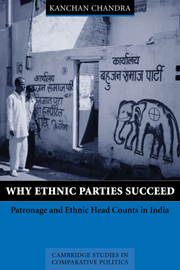Crossref Citations
This Book has been
cited by the following publications. This list is generated based on data provided by Crossref.
Alonso, Sonia
2001.
Controlling Governments.
p.
82.
Jarstad, Anna K.
and
Sisk, Timothy D.
2001.
From War to Democracy.
Birnir, Jóhanna Kristín
2001.
Ethnicity and Electoral Politics.
POSNER, DANIEL N.
2004.
The Political Salience of Cultural Difference: Why Chewas and Tumbukas Are Allies in Zambia and Adversaries in Malawi.
American Political Science Review,
Vol. 98,
Issue. 4,
p.
529.
Levi, Margaret
2004.
Problems and Methods in the Study of Politics.
p.
201.
Ferree, Karen E.
2004.
Iterative Approaches toR×CEcological Inference Problems: Where They Can Go Wrong and One Quick Fix.
Political Analysis,
Vol. 12,
Issue. 2,
p.
143.
GREIF, AVNER
and
LAITIN, DAVID D.
2004.
A Theory of Endogenous Institutional Change.
American Political Science Review,
Vol. 98,
Issue. 4,
p.
633.
Brancati, Dawn
2005.
Pawns Take Queen: The Destabilizing Effects of Regional Parties in Europe.
Constitutional Political Economy,
Vol. 16,
Issue. 2,
p.
143.
Betz, Joachim
2005.
The Institutionalisation of Parties and the Consolidation of the Party System in India: Criteria, State and Causes of Persistent Defects.
SSRN Electronic Journal,
Posner, Daniel N.
2005.
Institutions and Ethnic Politics in Africa.
STOKES, SUSAN C.
2005.
Perverse Accountability: A Formal Model of Machine Politics with Evidence from Argentina.
American Political Science Review,
Vol. 99,
Issue. 3,
p.
315.
Corbridge, Stuart
Williams, Glyn
Srivastava, Manoj
and
Véron, René
2005.
Seeing the State.
Chai, Sun-Ki
2005.
Predicting Ethnic Boundaries.
European Sociological Review,
Vol. 21,
Issue. 4,
p.
375.
Van Cott, Donna Lee
2005.
From Movements to Parties in Latin America.
Reilly, Benjamin
2006.
Democracy and Diversity.
p.
71.
Ciotti, Manuela
2006.
‘In the past we were a bit “Chamar”’: education as a self‐ and community engineering process in northern India.
Journal of the Royal Anthropological Institute,
Vol. 12,
Issue. 4,
p.
899.
Reilly, Benjamin
2006.
Democracy and Diversity.
p.
47.
Reilly, Benjamin
2006.
Democracy and Diversity.
p.
1.
Brass, Paul R.
2006.
Response to Reviews by Thomas Hansen, A.R.Momin, and Roger Petersen.
Ethnicities,
Vol. 6,
Issue. 1,
p.
114.
2006.
Democracy and Diversity.
p.
iv.





